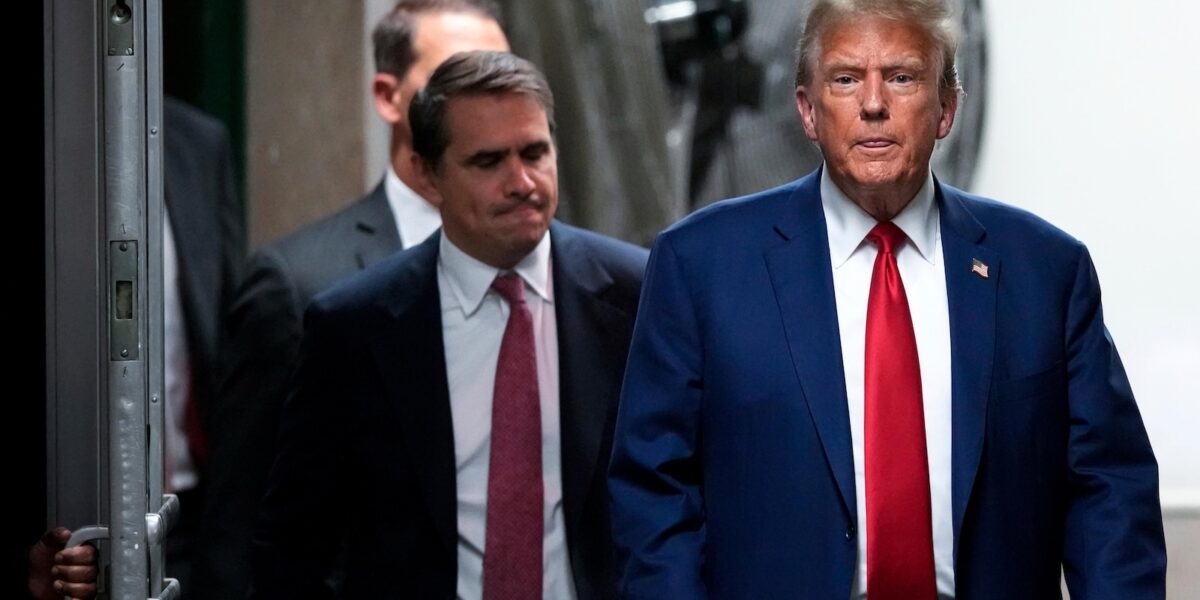NEW YORK — As the third week of witness testimony in Donald Trump‘s hush money trial takes place, all eyes are on who will be called next and whether the former president will be able to abide by the terms of his now twice-broken gag order that bars him from speaking publicly about jurors, witnesses and some others connected to the case.
Before Monday’s testimony began, Judge Juan M. Merchan found Trump in contempt of court for a second time, fining him $1,000 for a single violation and sternly warning the loquacious former president that jail time would be considered for future violations “if necessary and appropriate.”
Two people tied to the Trump Organization took the stand on Monday — former controller Jeffrey McConney and accounts payable supervisor Deborah Tarasoff — elaborating on a key piece of the charges against Trump: Michael Cohen’s reimbursement for the $130,000 Stormy Daniels payment.
Tuesday’s witness testimony is set to dig further into the events and people involved in what prosecutors have said was a scheme to influence the 2016 presidential election by buying and burying negative stories about the then-candidate.
The trial is in its 13th day.
Trump is accused of falsifying internal business records to cover up hush money payments — including the payment to Daniels — recording them instead as legal expenses.
Trump has pleaded not guilty to 34 felony counts of falsifying business records.
The case is the first-ever criminal trial of a former U.S. president and the first of four prosecutions of Trump to reach a jury.
Currently:
— Read the judge’s ruling on Trump’s most recent gag order violation
— Hush money, catch and kill and more: Terms to know in Trump trial
— What Trump’s gag order means in his hush money case
— Key players: Who’s who at Donald Trump’s hush money criminal trial
— The hush money case is just one of Trump’s legal cases. See the others here
Here’s the latest:
Assistant District Attorney Joshua Steinglass on Monday afternoon told Judge Juan M. Merchan in Donald Trump’s hush money trial that the prosecution’s case is proceeding ahead of schedule.
Steinglass said he estimates being finished with calling witnesses two weeks from Tuesday. While there’s the possibility of rebuttal witnesses, the estimate is related to the primary portions of the trial.
Once the prosecution is done, Trump’s lawyers can then call their witnesses.
The judge presiding over former President Donald Trump’s hush money trial fined him $1,000 on Monday for again violating a gag order barring him from speaking publicly about jurors, witnesses and some others connected to the case.
Judge Juan M. Merchan warned Trump that additional gag order violations could potentially result in jail time.
“The last thing I want to do is put you in jail. You are the former president of the United States and possibly the next president as well,” Merchan said. “There are many reasons why incarceration is truly a last resort for me. To take that step would be disruptive to these proceedings.”
While prosecutors flagged four prospective violations, Merchan only concurred with one — comments that Trump gave to a program called “Just the News No Noise” on April 22, which is broadcast on Real America’s Voice.
On the program, Trump criticized the speed at which the jury was picked and claimed it was stacked with Democrats. “The jury was picked so fast. 95 percent Democrats. The area’s mostly all Democrat,” he is quoted as saying.
Trump was fined $9,000 last week for nine earlier violations of the order.
Donald Trump was set to return to the courthouse in lower Manhattan on Tuesday for the 13th day of his hush money trial.
The third week of witness testimony began on Monday with two people tied to the Trump Organization taking the stand to elaborate on the hows and whys of Michael Cohen’s financial reimbursement for a $130,000 hush money payment paid to lawyer Keith Davidson in exchange for porn actor Stormy Daniels’ silence about a sexual encounter she said she had with Trump years earlier.
During the course of testimony, jurors saw notes, bank statements and other documents related to the financial reimbursement that is at the heart of the charges against the former president.
The 34 felony counts of falsifying business records accuse Trump of labeling the money paid to Cohen in his company’s records as legal fees. Prosecutors contend that by paying him income and giving him extra to account for taxes, the Trump executives were able to conceal the reimbursement.


